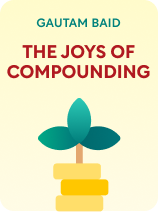

This article is an excerpt from the Shortform book guide to "The Joys Of Compounding" by Gautam Baid. Shortform has the world's best summaries and analyses of books you should be reading.
Like this article? Sign up for a free trial here.
Do you try to live by other people’s values? What does it mean to live authentically?
Living authentically means being true to your genuine self and values, much like an oak tree that remains rooted and unyielding amidst life’s changing seasons. By honoring your inner essence, you spark self-discovery and personal growth.
Continue reading to learn how to live authentically.
Live by Your True Self
In The Joys of Compounding, Gautam Baid offers advice for learning how to live authentically:
Be true to yourself: Act in alignment with your beliefs and values, rather than shaping your choices and behaviors to gain approval from others. This ensures your choices reflect your true self, fostering self-respect and self-confidence. For example, your friends dine at trendy restaurants but you choose your local diner because you genuinely enjoy simpler meals.
(Shortform note: One way to act in alignment with your values is to evaluate the motivations underlying your decisions. Some experts believe that all behavior is driven by the need to fulfill one of two motivation types: intrinsic or extrinsic. Intrinsic motivation comes from within: You accept your needs and express them by doing activities that make you happy. For example, you play an instrument out of sheer passion for music. Extrinsic motivation comes from your environment: You seek acceptance from others by doing activities that offer external rewards. For example, you play an instrument to garner accolades and admiration. This analysis suggests that being true to yourself means doing what intrinsically motivates you.)
Remain open-minded: Embrace change—by learning from your mistakes, adapting to fresh perspectives, and questioning ingrained habits or beliefs. This proactive approach deepens your self-awareness, ensuring you stay aligned with your evolving, authentic self.
(Shortform note: Cognitive Behavioral Therapy (CBT) practitioners offer practical advice for nurturing open-mindedness and personal growth: Each day, write down a few thoughts that seem automatic or reactive. Then, evaluate each thought, discerning whether it’s grounded in evidence or shaped by subjective feelings and perceptions. For example, if you write down, “I’m too old to learn new things,” assess whether the thought is supported by objective evidence or influenced by subjectivity. You might do this by considering people who’ve successfully learned new skills in their later years.)
Maintain a journal: Document your thoughts, decisions, and experiences to clarify your ideas, identify your strengths and weaknesses, and learn from your experiences. (Shortform note: Often called reflective journaling, this practice encourages regular introspection, helping you understand and crystallize your thoughts and feelings. This understanding paves the way for choices that enhance your well-being and happiness. Effective reflection requires three steps: 1) Describe your thoughts, decisions, or experiences and the emotions they evoke. 2) Analyze these reflections, drawing connections or making comparisons (for example, “this reminds me of that time when …”). 3) Decide how to apply your insights to upcoming situations.)

———End of Preview———
Like what you just read? Read the rest of the world's best book summary and analysis of Gautam Baid's "The Joys Of Compounding" at Shortform.
Here's what you'll find in our full The Joys Of Compounding summary:
- Why compounding isn't just a financial concept, but a transformative principle
- Strategies for compounding your well-being and happiness
- How to achieve steady and sustainable financial growth






